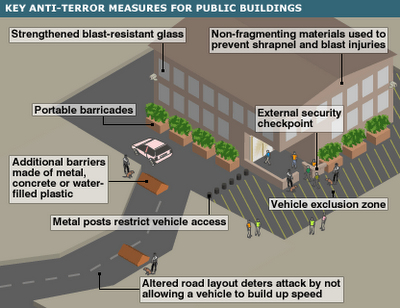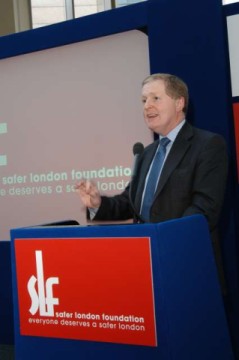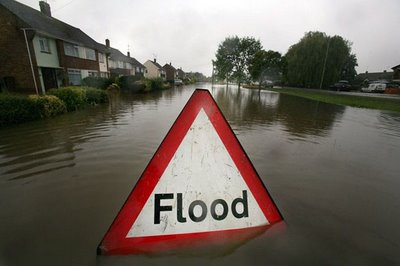The revisionism of Sir Ian Blair.
Another person to whom this doesn't apply is Tony's namesake, Sir Ian Blair. At one point in the distant past I wondered whether Blair wasn't actually the best we were likely to get, despite being such an utter scaremongering tit; as it turns out, I was completely wrong, and Sir Paul Stephenson has, despite the G20 police riots, been the archetypal safe pair of hands. Blair though, despite having been forcibly retired, is determined that he shouldn't be remembered as the man in charge when a Brazilian was shot by his officers and who didn't learn of the fact he wasn't the man they thought he was until the following day despite even his secretary knowing, and is instead attempting to put together a revisionist account of his own time as chief commissioner at the Met. Not about Jean Charles de Menezes - he's clearly lost that battle - but rather of his role in cheerleading for up to 90 days detention without charge for terrorist suspects.
First, he attempts to draw a hardly conclusive historical parallel:
"Any society that would give up a little liberty to gain a little security will deserve neither and lose both," said Benjamin Franklin. Nearly a century later, Abraham Lincoln would disagree: "The dogmas of the quiet past are inadequate to the stormy present. As our case is new, so we must think anew and act anew." That essential conflict remains alive today.
This is hardly comparing like with like. Lincoln faced the biggest catastrophe a nation state can - a civil war. In such circumstances, when the life of the nation can be conclusively said to be under threat, emergency procedures and laws which would never otherwise be considered as proportionate may well be vital. We at the moment face a tiny band of extremists who can be more than successfully contained using the normal powers of the criminal justice system, who pose no threat to life as we know it whatsoever. New threats do pose new problems, but while the threat may be new, the actual danger posed is relatively limited compared to those we have come through in the past.
After the fall of communism, the west believed it had won. Despite what we now know to be al-Qaida-inspired attacks in the US, East Africa and the Gulf, many supported Francis Fukuyama's theory that history had ended. The 2001 attacks on the twin towers suddenly revealed it had not. As the Balkan conflict had indicated, older conflicts were resuming, not with the left-right mutually assured destruction of the cold war but an asymmetric struggle in an age of global communication.
It would be unfair to suggest that this is Blair attempting to be the intellectual. When he says "many" supported Fukuyama's much quoted but rarely examined in detail treatise that history had ended, it's unclear whether he realises that Fukuyama was one of the original neo-conservatives who believed that the end of the Soviet Union was the perfect opportunity to massively extend US influence and power without anyone having the temerity or power to interfere. History had only ended, in Fukuyama's view, in that both democracy and neo-liberal economics had triumphed and were now the only realistic options for mankind. That nations which disagreed with this view could then have democracy and neo-liberal economics imposed on them by force already suggested that this was hardly the end of history, but then Fukuyama himself has since changed his mind, and is even now espousing "realistic Wilsonianism" as an alternative to the less benign neo-conservative he once identified with.
What we do not know is what happens next: whether the last decade will prove an aberration; whether or not al-Qaida will be marginalised and fade into history. There is no doubt that the centre of al-Qaida has suffered many setbacks: those of its leaders who survive are in hiding. However, the group's inspiration and its message remain vibrant, resonating across continents and borders. It can reach not only its adherents but also the lonely and the unbalanced, using new methods of communication, trumpeting the many causes of anger and despair in the world, suggesting new dreams of fulfilment, offering new tools of attack and searching for more, including radiological and chemical weaponry.
So the question is whether, echoing Lincoln, "our case is new". If it is, then it may be better to risk being at the mercy of the state than at the mercy of the murderously inclined. At the very least, it would be useful to hear the arguments of those who believe or believed that we must "think anew and act anew".
Except none of what Blair lists is new, nor are we unable to adapt to it. He also presents the classic false dichotomy: we need neither be at the mercy of murderously inclined or at the mercy of the state. The current limits on detention without charge, which is what Blair is leading to discussing, do not put us at the mercy of the murderously inclined, but extending the limit further may well be putting the innocent at the mercy of the state.
By 2006, Britain had twice been attacked by suicide bombers and the plot to blow up airliners had been uncovered – a plot described by the trial judge as "the most grave and wicked conspiracy ever proven within this jurisdiction". We believed that we could not properly investigate these crimes within the period then available for detention.
Strange that Blair doesn't additionally list the case of Dhiren Barot, which he formerly described as a "true horror". Barot planned to construct a dirty bomb using smoke alarms, a crime so terrible that his handlers decided not to bother funding his fantasies. It's also instructive that Blair uses "believed" rather than "knew" or "expected", as those crimes were indeed investigated within the period then available for detention. The 21/7 attackers were dealt with successfully under the 14 days then available, while the "liquid bombers" were charged on the 28th day. Since then, anything longer than two weeks has not been needed in any terrorist investigation.
We proposed an equivalent of the system of "investigative detention" used in Europe – a rolling series of detention periods of up to seven days at a time, granted by increasingly senior members of the judiciary, with prisoners legally represented at each judicial hearing and throughout police interviews. This was necessary, we said, owing to the growing need to intervene in internationally constructed plots at a very early stage, given the scale of al-Qaida ambitions. At such early stages it was difficult to distinguish main conspirators from lesser players, there were language barriers and problems with encryption. We suggested an outer limit of 90 days.
Now this really is open revisionism - the up to 90 day period was never once described as the equivalent of the system of "investigative detention" used in Europe, probably because it isn't an apposite comparison, as the legal systems in which investigative detention is used differ from our own. The judicial nature was only ever used as a fig leaf - only the boldest judges are ever going to openly disagree with the police when they say they need more time to potentially prevent a terrorist attack. Even with the extra time, the police have still consistently failed to distinguish main conspirators from lesser players, with at least three men involved in the liquid bomb plot released without charge after the full 28 days. One of those tried in that case was cleared of any involvement after the second jury trial. Problems with encryption could have been got round used already applicable laws. Even in retrospect, Blair fails to conjure up anything approaching a convincing case.
It seemed to us that this was like bird flu: when that threatened, the public were entitled to hear from the chief veterinary officer, now they should hear from the police. But no: commentators of all stripes said this was the police being political. It was not. It was the police being the police, talking about policing. We should not be seen as street butlers, silent until spoken to.
Except this doesn't even begin to reflect what Ian Blair was doing when it came to discussion of 90 days. He wasn't just suggesting what was needed, or telling the government what he thought was necessary, leaving it to them to make the case, he himself was actively campaigning for the change, as did other officers. The Tories told at the time of the 90 day vote of MPs being contacted by their local chief constables urging them to rebel against the Tory whip and support the government. Again, it's also not an apposite comparison: the chief veterinary officer acts directly as an adviser; the chief commissioner of the Met is in charge of the police, who uphold the law, not actively attempt to make it up as they go along, a very good reason for them to be directly separate from it. It's also the case that the police will always claim that they need new powers regardless of whether they do or not; anything that makes their job easier and which gives them more authority is to be welcomed. It is the politician's job to resist it. The connect between the two Blairs became so close that the dividing line became indistinct. Neither saw this as a problem, and that in itself was worrying.
Still, much of this now feels like the ghost of Christmas past. Gone is the unrelenting paranoia of the terrorist threat; now we instead have the economic threat, much more real and much more damaging than the terrorist threat ever was. Whether we will feel the same way about our upcoming overlords as we now do about our previous ones may well depend on what happens tomorrow.
Labels: 42 days, 90 days, civil liberties, Jean Charles de Menezes, Metropolitan police, police, politics, revisionism, scaremongering, sir ian blair









